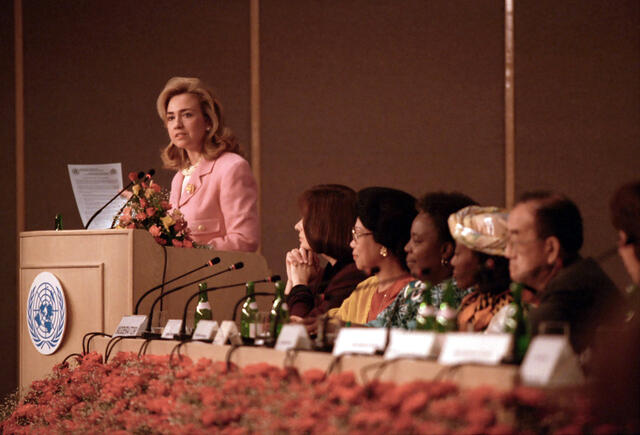
Women’s Rights Are Human Rights

This year marks 25 years since the Fourth World Conference on Women: Action for Equality, Development and Peace, which was convened by the United Nations in Beijing in September 1995.
The conference is most remembered for then U.S. First Lady Hillary Rodham Clinton’s speech “Women’s Rights Are Human Rights,” which became a rallying cry for global gender equality.
But the conference also yielded significant policy advancements, most notably the Beijing Declaration and the Platform for Action, which set “strategic objectives and actions for the advancement of women and the achievement of gender equality in 12 critical areas of concern.”
Yasmine Ergas, the director of SIPA’s Gender and Public Policy specialization and a lecturer in discipline in international and public affairs, recently shared her reflections on the 25th anniversary of the Beijing conference. Ergas’s comments have been edited and condensed.
The Beijing conference was really important because it galvanized an enormous amount of interest and because it elevated a slogan that had been percolating through the women’s movements for a number of years: “Women’s rights are human rights and human rights are women’s rights.” It transformed that slogan into the guiding principle of a program for public policy that committed governments the world over to pursue specific objectives in different sectors from employment to education and health and so on.
The general objective was to move toward gender equality. It was important that the Declaration and Platform for Action used the language of gender even though, in fact, they dealt very narrowly with women’s rights. These general objectives included, among other things, the rights of women to control their own bodies and their own fertility. These rights had to be negotiated, but they were there. So, the Beijing Conference was important for the substantive objectives that it set.
Beijing recognized that gender equality is not just something where you add women or add another group and stir, and there’s no pain. Gender equality requires transforming social structures the world over. It is going to be long and hard and painful and it’s something that we must be equipped to deal with over the long haul. We must be committed from day one, and remain committed.
The conference also stipulated that gender equality is not just a task for governments, recognizing that governments must work together with international organizations, with civil society organizations, and in particular with the women’s movements that had been very vocal in Beijing.
In the years since the Beijing conference, there has been a lot of research on what makes it more likely that human rights are actually going to be implemented and will become realities, in governmental practices and in our own lived experiences. The one factor that comes up again and again is the mobilization of civil society. You must have the space for—the possibility for action by—civil society organizations that exercise advocacy, that press for objectives, that lead the way forward.
In the years since Beijing, building on what had come before, we have in fact made enormous strides.
We have new institutions like UN Women, which is dedicated to gender equality and women's empowerment. We have institutions and organizations at the regional level and regional governments. We have new treaties that center on issues concerning women's rights. We have constitutional courts that have incorporated principles of gender equality and national governments that have created what have been called gender equality machineries. Gender equality is part of the UN Sustainable Development Goals. We have much slower progress, but progress nonetheless, on LGBTQ+ issues.
I and many of my colleagues can give you critiques of all these achievements. They’re insufficient. They institutionalize and they discipline, rather than giving women and LGBTQ+ people free rein to develop their issues and full respect for their claims. There are all sorts of limitations. But nonetheless, up to now, the path has largely been forward. Now, in many countries, we face a difficult backlash. So, the priority today is to maintain, and strengthen, our commitment to promoting gender equality.